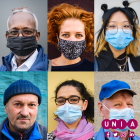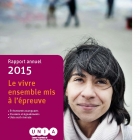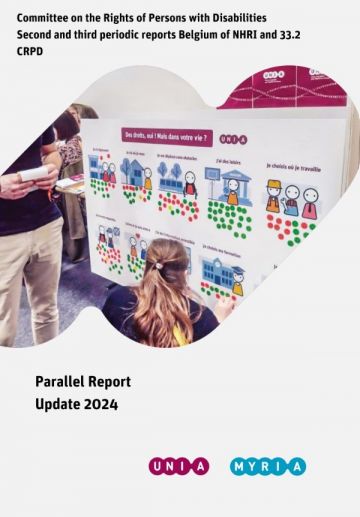Second evaluation of Belgium by the UN Committee on the Rights of Persons with Disabilities: report and recommendations (2024)
Ten years after the first evaluation, the UN Committee on the Rights of Persons with Disabilities has reassessed Belgium’s respect for the rights of people with disabilities. Following this assessment, the UN Committee adopted its “concluding observations” on the respect of these rights. Unia, as the independent mechanism responsible for monitoring the Convention in Belgium, took an active part in this second evaluation procedure.
On this page, you will find information on the UN Committee's concluding observations and the role played by Unia in this procedure, which took place between 2019 and 2024.
What are the findings and recommendations of the UN Committee?
In its concluding observations of September 5, 2024, the UN Committee's experts concluded that (read the UN's conclusions here soon).
We note that Unia's concerns and recommendations have been heard and taken up in this “bulletin” from Belgium (to be completed).
What role has Unia played in this second evaluation?
Unia intervened throughout the evaluation procedure to give an independent view of the respect for fundamental rights of people with disabilities in Belgium and to ensure that the Committee’s recommendations are the most relevant for people with disabilities.
In 2019, Unia worked to influence the list of questions posed by the Committee to the authorities that served as the basis for Belgium’s report. In 2020, Unia carried out a consultation of people with disabilities on the respect for their rights and another on the impact of the COVID crisis on them and their loved ones to inform its work with the Committee. In 2021, Unia drafted a parallel report to comment on, correct and add to the information provided in the Belgian report. In 2024, Unia updated its parallel report and took part in consultations with the Committee and constructive dialogue in Geneva (see below).
Unia’s parallel report (2024)
This report presents Unia's findings in the areas covered by the UN Convention. These findings focus on barriers to the inclusion of persons with disabilities, as well as practices, policies or legislation that do not respect their rights. Unia makes 87 recommendations aimed at removing these barriers to inclusion.
In this regard, Unia notes the following:
- public buildings and public spaces, public transport, as well as the media and the internet, are still insufficiently accessible;
- in the event of an acute crisis or disaster (the corona crisis or the floods in 2021), Belgium does not yet have a crisis management plan that takes people with disabilities into account;
- Support services for inclusion are not sufficiently used and valued;
- Funding for the specific needs of pupils with disabilities largely goes to special education;
- government funding is still mainly focused on employment in adapted work companies and too little funding is allocated to supported employment in mainstream sectors;
- the justice of the peace now has to rule systematically on the voting rights of persons with protection status
The report clearly shows how the violation of one right also leads to the violation of the other fundamental rights.
In accordance with the cooperation agreement between Unia and Myria, the Federal Migration Centre, the latter contributed to the drafting of the parallel report for the parts relating its competencies.
Unia’s interventions before the UN Committee (2024)
During the constructive dialogue between Belgium and the Committee on August 22, 2024, the Committee’s experts put questions to the representatives of the various authorities on how Belgium had progressed in the concrete implementation of the Convention’s rights.
Unia was given the floor to open and close the session.
The question asked was: are the rights of people with disabilities better respected today than they were 10 years ago, when the Committee first made its recommendations? Unia pointed out that, with the exception of a few significant advances, too little progress had been made in important areas such as education, accessibility and institutionalization.
At the end of the day, Unia stressed its concern at not having heard:
- An explicit response on a ban on segregation
- A commitment to ensuring the accessibility of existing buildings
- What the authorities intend to put in place to guarantee assistance in decision-making
- A commitment to put an end to the indefinite deprivation of liberty of interned persons
Unia then appealed to all Belgian authorities to make use of this evaluation: “Use the Convention. Use the recommendations of civil society, the independent mechanisms and the Committee, to create an ambitious plan that will effectively implement all the articles of the Convention. That way, we can come back to you for Belgium's next evaluation confirming that, yes, the rights of people with disabilities in Belgium are better respected today than they were 10 years ago.”
- Recording of discussions on articles 1 to 13 of the Convention (Unia intervention between 22’40” and 27’45”)
- Recording of discussions on articles 14 to 33 of the Convention (Unia intervention between 2'55'' and 2'55''))
- Written summary of discussions on the Committee website
- Opening and closing speeches by Unia
Comparable publications
Annual report 2020: vulnerable human rights in times of crisis

In this extraordinary year, Unia continued to fight for human rights and equality. The corona pandemic acted like a magnifying glass. Those already in a vulnerable position were often the first or hardest hit by Covid-19 or its measures.
Evaluation of federal anti-discrimination legislation (2017)
Article 52 of the Anti-Discrimination Law states that the application and effectiveness of the anti-discrimination laws must be assessed by the Legislative Chambers. Unia has prepared an assessment report on the Anti-Discrimination Law and the Anti-Racism Law based on its own practical experience, national jurisprudence and its general expertise in the fight against discrimination.
Annual report 2015. Living together put to the test.

The year 2015 left a deep mark on our society. Violent conflicts and tensions on a global scale have had a direct impact on us. As we finalise this annual report, Belgium is suffering the repercussions of the bomb attacks at Zaventem airport and Maelbeek metro station in Brussels.
Report ‘Improving Equality Data Collection in Belgium II‘ - disability, state of health, physical characteristics
_140_140_s_c1.png)
Unia has conducted a second study on equality data collection in Belgium. This time the project focused on the criteria disability, health status, and physical characteristics.

